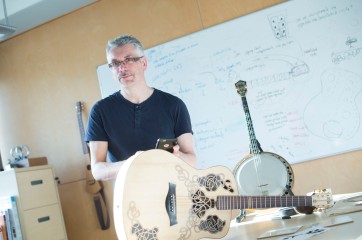The conference will feature keynote talks from leading voices in the field of HCI:
- Prof. Yvonne Rogers, University College London Interaction Centre
- Dr. Gavin Doherty, Trinity College Dublin
- Prof. Steve Benford, Mixed Reality Laboratory, University of Nottingham
Further details of each speaker and talk are given below:
 Prof. Yvonne Rogers: Do We Need to be Disciplined in HCI?
Prof. Yvonne Rogers: Do We Need to be Disciplined in HCI?
Much has been written about the potential benefits of being interdisciplinary. By bringing together distinctive components of two or more disciplines, traditional boundaries can be crossed resulting in new insights and technological advances. Talking with others who have been trained to frame, think about and solve problems differently from oneself can lead to new ideas, insights and disagreements. It is this combination of spark, aha and friction that encourages risk taking and daring to be different. The resulting collaboration often equates to working in terms of a mix of serendipity and invention where creative experimentation ends up driving the research. The price is losing the security blanket of conventional paradigms and ‘tried and tested’ methods. To demonstrate how such a lack of discipline can be productive but scary, I will illustrate my talk with some interdisciplinary projects that I am most proud of; many of which exhibit new forms of ‘ludic engineering’ that have promoted learning through novel, playful visions of technology. These include designing novel learning experiences, rethinking ageing in terms of creativity, and encouraging people to change their behaviour through technological nudging.
About: Professor Yvonne Rogers is the director of the Interaction Centre at UCL (UCLIC), deputy head of department for Computer Science and a professor of Interaction Design. She has been instrumental in promulgating new theories (e.g., external cognition), alternative methodologies (e.g., in the wild studies) and far-reaching research agendas (e.g., “Being Human: HCI in 2020” manifesto). The current focus of her work is on human-centred data and people in the Internet of Things in urban settings. She is the author and co-author of 13 books and has published over 250 peer-reviewed journal papers, conference proceeding articles, and book chapters in HCI, Ubicomp, CSCW, cognitive science and technology-enhanced learning. She is a co-author of the definitive textbook on Interaction Design and HCI now in its 4th edition that has sold over 150,000 copies worldwide and has been translated into 6 languages. She is a fellow of both the BCS and the ACM CHI Academy.
 Dr. Gavin Doherty: The secret life of e-health interventions
Dr. Gavin Doherty: The secret life of e-health interventions
In this talk I will discuss, using a series of examples of systems we have developed, some of the issues encountered in the development of novel e-health interventions, and the challenges they raise for HCI research. We will consider the difficulties encountered when trying to get new technologies into clinical use, and a number of the trade-offs involved. The talk will also consider what happens afterwards, and what opportunities have been opened up for HCI research.
About: Dr. Gavin Doherty is an Associate Professor in the School of Computer Science and Statistics at Trinity College Dublin, and co-founder of SilverCloud Health. He is interested in design for specific application areas, and has led a number of interdisciplinary projects in a number of different domains. A major focus of his work over the last decade has been on the design of technologies for mental health. The aim has been to develop systems which can increase access to, increase engagement with, and assist in improving the outcomes of mental health interventions.
 Prof. Steve Benford: In the Footsteps of the Bard
Prof. Steve Benford: In the Footsteps of the Bard
Inspired by the great Irish bard Turlough O’Carolan, my talk will undertake something of a musical journey, drawing on the design of an unusual musical instrument to tell a story of craft, music, digital technologies and HCI. I will describe the inspiration for building a unique acoustic guitar – called Carolan – that gathered songs and stories as it travelled and that made them available through its interactive decorative inlay. I will reveal how, by acting as a travelling technology probe, Carolan captured insights into the relationships between everyday things and stories of their provenance, utility and personal meaning, as well as into HCI’s broader engagement with music, craft and creativity.
About: Steve Benford is Professor of Collaborative Computing in the Mixed Reality Laboratory at the University of Nottingham. His research explores unusual interactions for cultural and creative experiences and involves working with artists to create, tour and study interactive performances from which he generalises provocative design concepts. He has received best paper awards at the ACM’s annual Computer-Human Interaction (CHI) conference in 2005, 2009, 2011 and 2012 and been awarded the 2003 Prix Ars Electronica for Interactive Art, the 2007 Nokia Mindtrek award for Innovative Applications of Ubiquitous Computing and received four BAFTA nominations. He was elected to the CHI Academy in 2012. His book Performing Mixed Reality was published by MIT Press in 2011. He has previously held an EPSRC Dream Fellowship and been a Visiting Professor at the BBC in 2012 and a Visiting Researcher at Microsoft Research in 2013.